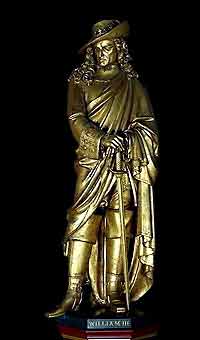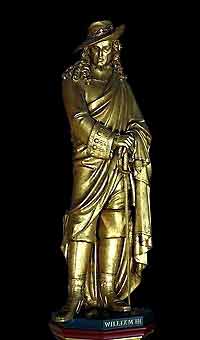William III of Orange (b.1650 r.1689-1702)
© 2007
Armchair Travel Co. Ltd. - This page may be used for non-commercial purposes
ONLY!
![]()

[ Play
Narrated and Animated Movie ! ] His most illustrious antagonist, the great Condé remarked, that the Prince of Orange had in all things borne himself like an old general, except in exposing himself like a young soldier.
William, the son of Mary Stuart (daughter of Charles I of England), was born in The Hague in 1650, a few days after his father William II, Prince of Orange's death. He was educated and trained as a ruler and had great charm and vivacity. Republican opposition parties made life difficult for him first by the Act of Seclusion which prevented him from holding office and then by decreeing that the same person could not hold the position of Stadholder, i.e. ruler and Captain-General of the armed forces. Both of these were rescinded because of his extraordinary personal qualities which were sorely needed in 1672 when both France and England jointly attacked the United Provinces.
William's fleet held the English at bay but the French quickly overran several provinces and were only halted by William's drastic measure of flooding the polders (areas below sea level). He refused the peace terms offered by the English and French which would have crippled the country. He then sought and received the support of both the Holy Roman Emperor and the Elector of Brandenburg, and with some help from the Spanish gained enough time to rebuild his army with which he recaptured a key fortress the next year. William then moved east, and joining up with the Emperor, captured Bonn. His enemies were thus forced to make peace which was finally confirmed by treaty in 1679.
In 1677 William married his cousin Mary, James II's daughter, which served to bring him to the attention of the English people. Because of James' increasingly Catholic tendencies, William was requested by the Protestant opposition to intervene. When James had a son in 1688 it became clear that unless action was taken, the situation in England would worsen and so William was invited to become King of England. He landed with an army in Devon and moved unopposed to London (James had fled on William's arrival). The next year Parliament confirmed that James had abdicated and formally offered William and Mary the crown. Their coronation took place in April 1689 and they received the crown of Scotland soon after.
Although the 'Glorious Revolution' had succeeded without serious bloodshed in England, the story was very different in Scotland and Ireland, which both had significant Catholic factions. First Scotland gave trouble, but the revolt quickly subsided although an aftermath happened in Glen Coe when clan rivalry led to a massacre in 1692, blamed on the Campbells, and there was unrest for another three years until William meted out some tardy and not very severe punishment of the leader. William had to take an army over to Ireland to suppress the resistance there and after the successful defence actions at Londonderry and Enniskillen, he defeated the insurgents at the Battle of the Boyne in 1690.
On the continent, William had to take action after Louis XIV invaded the Palatinate in 1688 and with his extraordinary diplomatic gifts, managed to put together a formidable grand alliance against France. The war see-sawed for many years without a conclusion until all parties became war-weary and sued for peace in 1697. William then concluded two treaties with Louis XIV of France, which the French King broke the next year after the death of the Spanish King. Louis also made a proclamation that his son was to be considered King of England, which put new impetus behind Parliament to prepare for war, as William had anticipated. Suffering increasingly from poor health, William died in 1702. His aims of creating a balance of power in Europe were not to be achieved until after the Treaty of Utrecht in 1713, following Marlborough's decisive victories in the next reign.
Since their devotion to each other had been a strong support to William during an unusually hard-working and testing life, following Mary's death in 1694 William became a more introverted figure. He was, for his times, an unusually tolerant man in the religious sphere. It was perhaps this tolerance combined with his high personal standards and military training which inspired his men, from whom he demanded much. In his private life, William supported the arts and looked after his own estates well with considerable sympathy for his tenants. He reformed the currency, establishing the Bank of England in 1694, and he granted independence to the judiciary by the Act of Settlement in 1701.
There is one certain means by which I can be sure never to see my country's ruin; I will die in the last ditch.
King William thinks all
[ Virtual
Tour ] [ Main Topics
Index ]
- T.B. Macaulay, History of England.



Additional Information on
William III of Orange (b.1650 r.1689-1702)
QUOTATIONS
- William to the Duke of Buckingham, 1672.
Queen Mary talks all
Prince George drinks all
And Princess Anne eats all.
- Anon., shortly after The Glorious Revolution of 1688.
Explore-Parliament.net: Advanced Category Search
Keyword Categories:
_Object_Portrait
_Object_Artwork
_Object_Sculpture
_Artist_Philip
_King
_Royal_Family
_Man
_Person
_William_III_